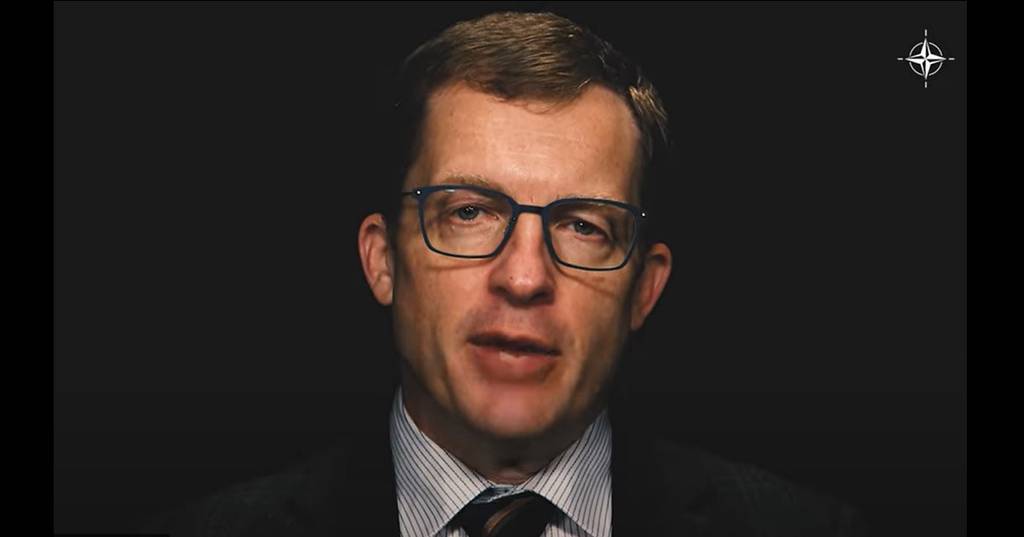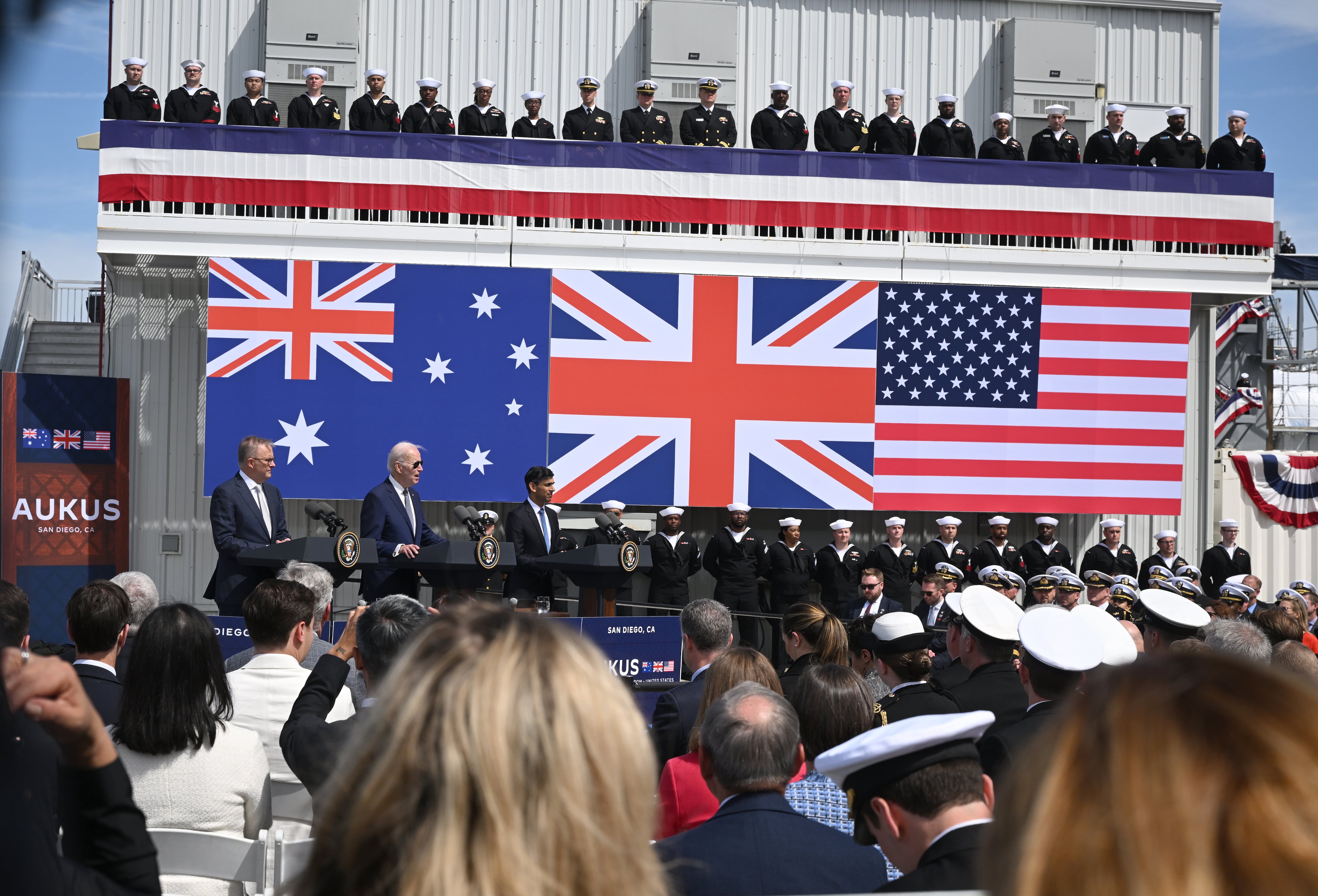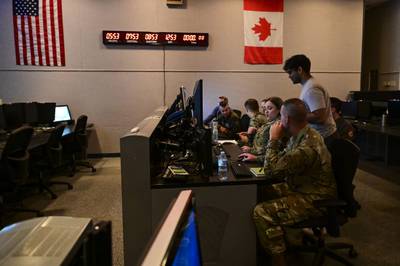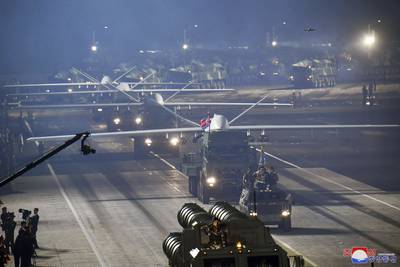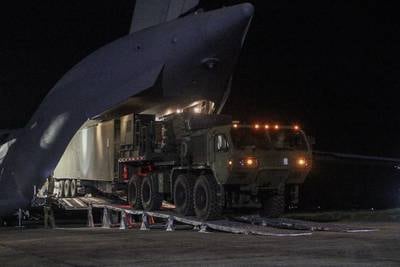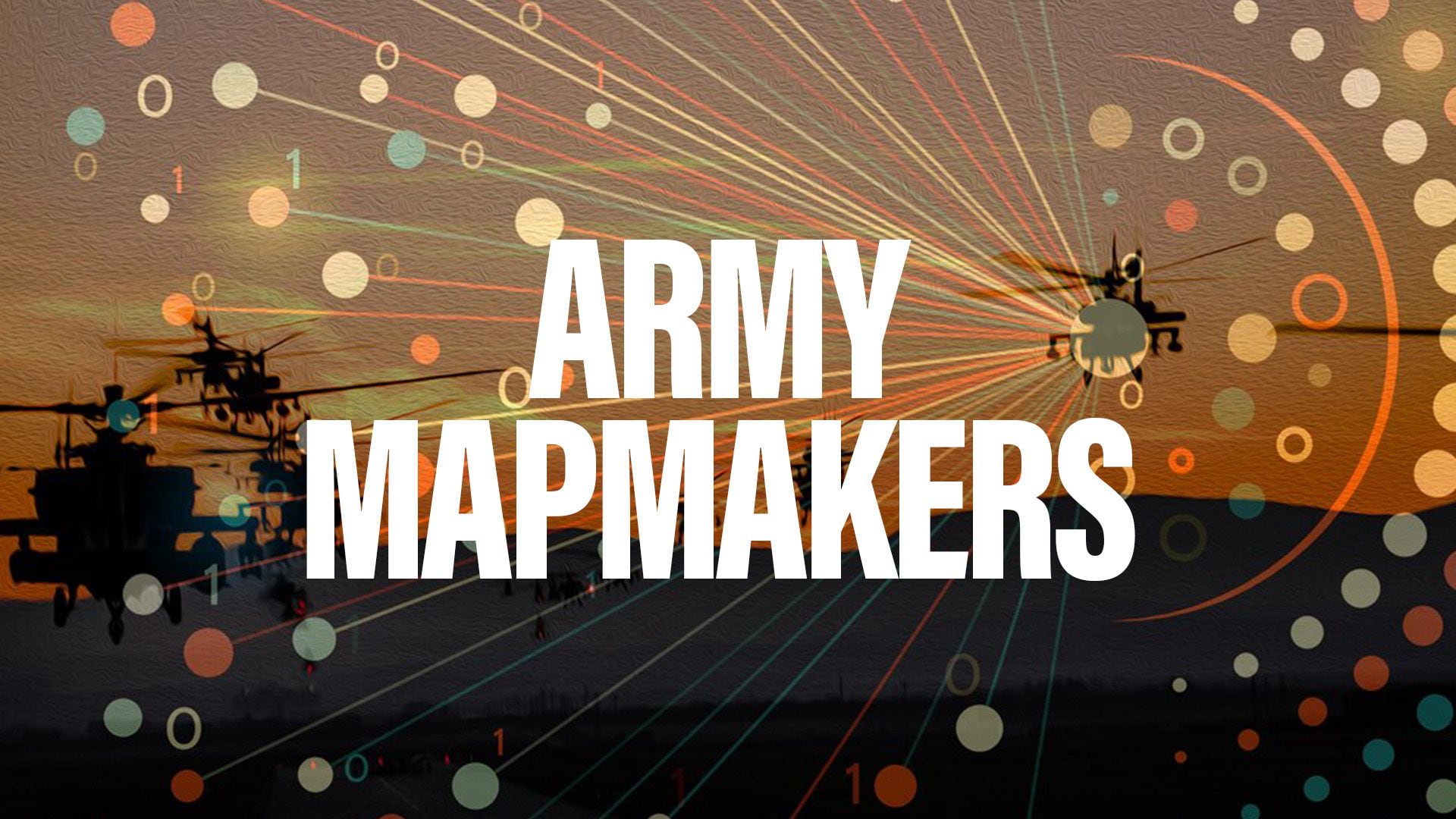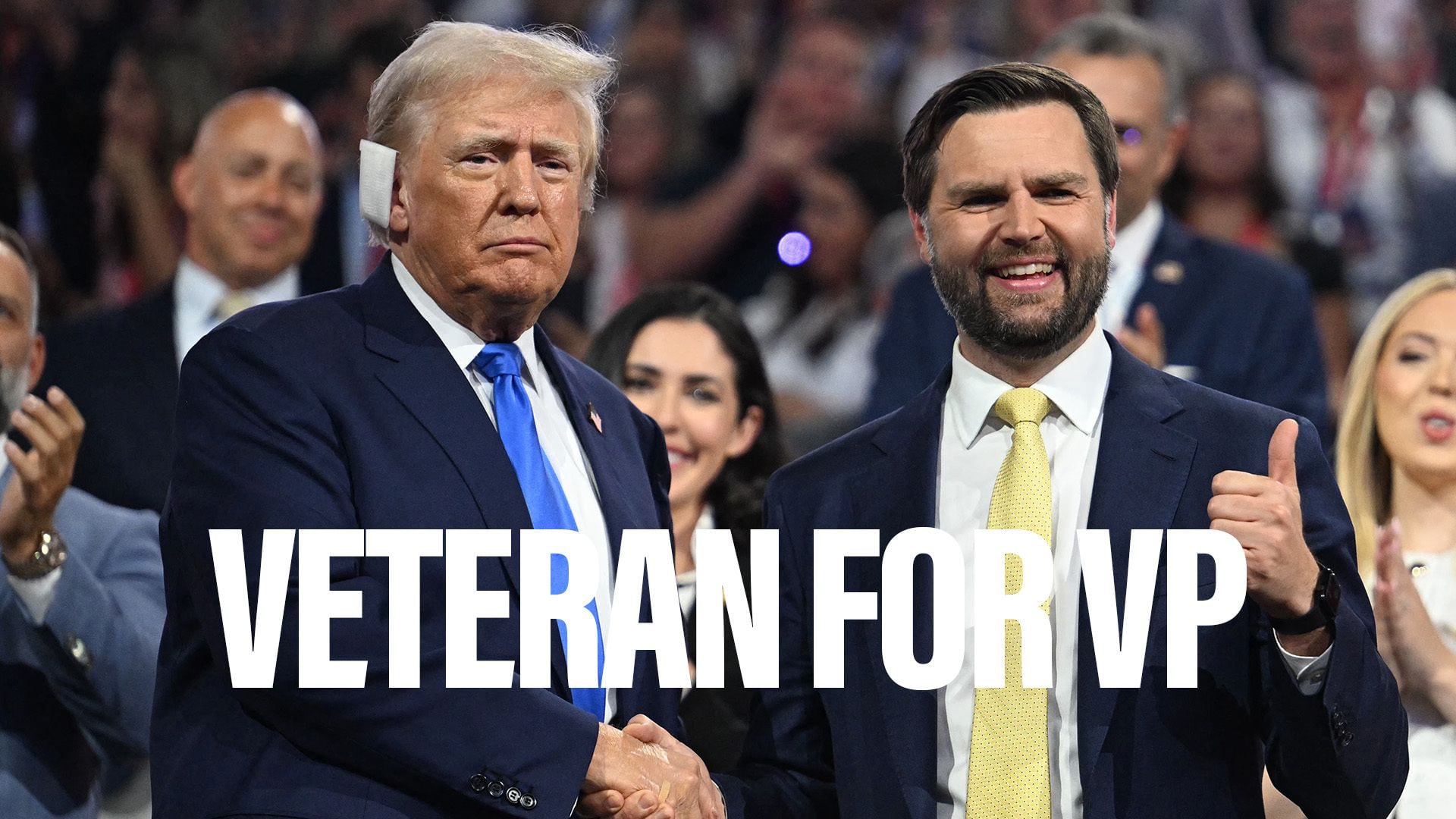Military Times’ Senior Managing Editor Kimberly Dozier sat down with David Cattler, NATO’s assistant secretary general for intelligence and security, on the sidelines of the 2023 Lennart Meri Conference in Tallinn, Estonia, earlier this month. Cattler started as a naval surface warfare officer, patrolling the Pacific and taking part in Operation Southern Watch, aimed at keeping Iraq dictator Saddam Hussein from harming U.S. Iraqi Shiite allies in the south of his country.
Cattler now wrangles some 80 intelligence organizations from 31 NATO members, organizing their efforts somewhat like the director of national intelligence provides guidance to U.S. intelligence agencies. His main focus right now? Russia’s all-out war on Ukraine and its hybrid war against Ukraine and NATO, as well as the rest of Europe. This conversation has been edited for brevity and clarity.
Q: What does the hybrid fight look like right now?
A: Let’s start with the NATO definition of hybrid threats: Combining military and nonmilitary means to take covert and even overt action that involves everything from disinformation and cyber attacks, economic pressure, energy, coercion, irregular armed groups and even use of regular military forces.
These hybrid methods are used to blur the lines between war and peace, and to attempt to sow doubt in the minds of target populations, really with an aim to destabilize and undermine societies. And what we’ve observed is that the speed, scale and intensity of these hybrid activities has increased in recent years.
Ukraine has been victim to hybrid attacks … since even before 2014 when Crimea was illegally annexed. In some ways, the beginnings of the Russian deployment for the annexation was also a bit of a hybrid operation, in that there were “little green men” there. They didn’t wear identifying badges on their uniforms, clearly intended to create some confusion or to sow some doubt, to cause [Western] decision-making to be a bit delayed, hopefully, to deny consensus, and so on … that could prevent the outcome, this illegal annexation of Crimea.
And then in the years in between, you’ve seen everything from sustained cyber attacks of varying scales, denial of service data, exfiltration and so on, and then attempts to really undermine the Ukrainian people’s confidence in the government, undermine elections, try to steer the government in a direction against a Euro Atlantic alignment, whether for the EU or for NATO.
Q: And the Russian message now?
A: What they’re saying is that external support to Ukraine, if not illegal, prevented under international law, is actually against peace, which is really hard to comprehend when you’ve initiated an illegal war of aggression. Asking the country that you’ve illegally invaded to lay down their arms as a humanitarian gesture is a bit of a stretch, and then also to say to nations — that have the right under international law to come to Ukraine’s defense and assistance — that they may not provide that aid, because it extends the war and increases the human cost? Certainly, we don’t agree with it. But this is the voice in this so far from Moscow.
Q: What of their attempts to message that the Western alliance is experiencing war fatigue?
A: I think war fatigue is a real thing. … You have it in Russia. You see it now, with people refusing to be mobilized and called up. You see it in feedback from soldiers that have been mobilized against their will, or that had been promised one thing, like being in the rear providing rear security or logistics, and then wind up in Bakhmut with little to no training and very poor equipment.
I think there’s a potential that you could see war fatigue elsewhere. In Ukraine, they have been subjected to very, very substantial, not just hybrid attack, but also direct physical attack, with many, many allegations of Russian war crimes and crimes against humanity. And that all does weigh on the society.
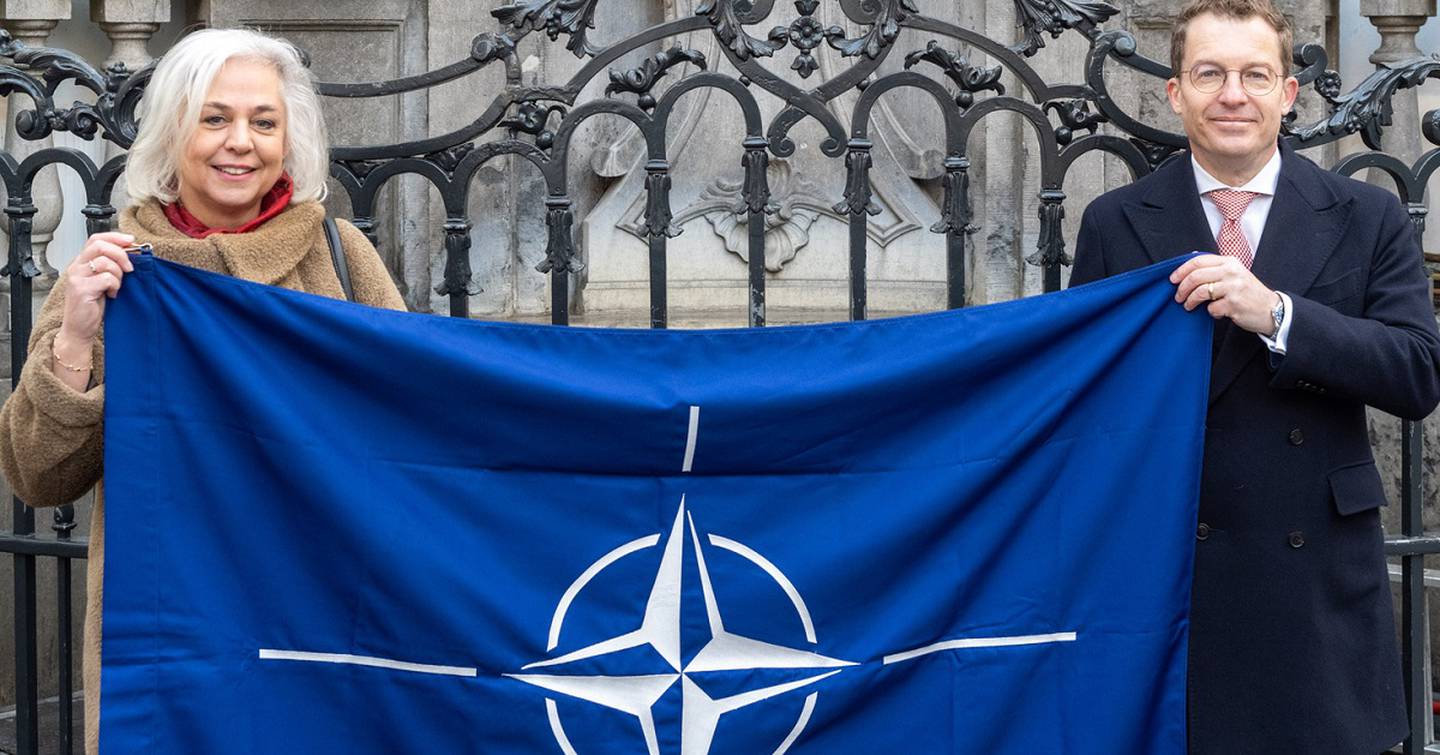
Q: But the message that the West is getting tired of war?
A: Look … we need to make clear that we will stand by Ukraine for as long as it takes, that we understand that it’s not just about protecting ourselves with stronger resilience, but it’s very important in a hybrid sense. Meaning that we’ve got the capability to withstand disinformation and propaganda, but also an understanding that there are costs that we feel due to higher inflation, energy prices, and so on.
RELATED
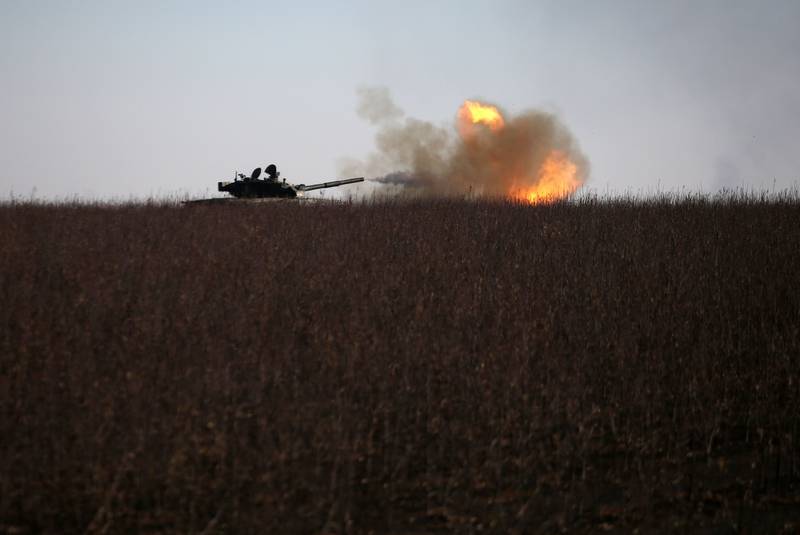
But it’s the right thing to do, not just to help Ukraine, but also to help ourselves when we look at the longer term security implications of the war, because Russia has made clear … in January of 2022, at least, that what they actually wish to see is a revision of the international security order and, especially on their border, to roll back NATO to make changes in the security environment that are not, in fact, in line with international law and the sovereign rights of states.
Now, Ukraine feels it directly because they’ve now suffered this expanded invasion. But I think this is also a key reason why so many nations have stepped up and have made the political statement of resolve and also have acted on that statement by providing this assistance now for more than 444 days.
Q: U.S. soldiers, sailors, airmen and Marines have been told to prepare for war with China. Why should they be paying attention to what Russian troops are doing in Ukraine?
A: I think we can and should be able to handle and think about more than one thing at a time. The resolution of the war in Ukraine, I mean, just from the legal aspect of it alone, has bearing on other potential disputes around the world, even potentially including China and Taiwan. You could think of Russia and Georgia, and also, Moldova and Transnistria (an unrecognised breakaway state that is internationally recognized as a part of Moldova). There are a few other frozen conflicts around the world where these sorts of resolutions really matter.
And I think there’s been a good argument made in a lot of really strong public analysis that if Ukraine prevails, and the international order is preserved, that also helps maintain an international legal system and peace and stability … so these are very important.
Please remember that we … have a set of very important values. The idea that people have an inherent right to be free, that nations have a right to be sovereign, independent and make their own decisions, and that human rights are preserved on an individual level are things that I know we hold very dear.
And so I think this war in Ukraine is important to us whether we are Ukrainian or not. The war matters because of the things that are happening that we wish to stop and what the war means in the longer term for Ukraine, for Euro Atlantic security and also for international security.
Q: Has this war also been important for learning how Russia fights?
A: Yes, I think it is pretty clear in the way the Russians fight that a lot of the military way of thinking seems to be very Soviet in its mindset, in terms of command and control … in the operational art, the way they organize, the way they choose to fight and the way that they employ weapons.
Look at the use of artillery, for example. It’s very high volume with less precision, but then at huge cost in terms of the ammunition expenditure and also the damage on the ground. These are things that are not usually associated with modern warfare. They’re more commonly associated with World War II and even, in some cases, World War I. So they continue to do more and more poorly on the battlefield.
Q: Does the U.S. risk seeing Russia as too weak, whereas before they saw Russian troops as sort of 10 feet tall? Have we gone in the other direction after seeing their performance in Ukraine?
A: I think most of us did not think the Russians were 10 feet tall. … But they had credible capabilities … both strategic and conventional. ….
Some make a mistake when they say that because Russia has been unable to translate the military activity into the strategic political effect, that means that they’re not doing anything. Completely false. They’ve done a tremendous amount of damage. And that damage is devastating on a practical human level. And that’s why I say I think it’s a mistake to lose sight of that.
And then further, they still retain great nuclear capability. They have the largest nuclear inventory in the world. And that does represent an existential threat, potentially, that needs to be really closely monitored and understood. That’s still retained. And this is a force that in some ways, is larger.
Just because an army is less capable doesn’t mean that it can’t cause significant damage, as this one has done and continues to do so.
Q: And you’ve been having to warn American and international companies about another threat from Russia: critical infrastructure threats.
A: To be clear, I’m not attributing the Nord Stream I or II attacks to Russia. But I’m just pointing out that you see that … the investigation has already preliminarily, to the extent it can, confirmed that it was sabotage and not a naturally caused outage in the two pipelines.
And we’re increasingly mindful that the way our societies have evolved, whether for information technology, communications, financial transfers, or for energy, now natural gas and oil transfers, but increasingly in the future, offshore windmills and solar panel arrays and so on, that we need to pay attention to the potential that Russia could choose to attack that infrastructure.
We already see them mapping undersea infrastructure. We know that they have capabilities that they’ve sought to preserve and expand over time to do the sorts of activities whether for intelligence, or for more hostile activities, more hostile actions against that infrastructure. And we have to look for it because, as I said in the definition, economic … leverage and energy leverage are two tools that we would consider to be in the hybrid toolkit.
Part of our public outreach has, in fact, been to the private sector — to the energy industry, to telecommunications industry, to IT service providers, network operators, and so on — to try to explain the potential of these threats because they have a large stake in the risk.
They do own some of it, and they also have some capabilities on their own to help us monitor, to provide that situational awareness and to see some anomalies, potentially to detect problems in the system. And I think, in some cases, they’re likely to be first, in fact, to see these things. …
I think it was the open ocean that they used to consider was the protection — that they had to provide armor for a telecommunications cable close to the beach so an anchor couldn’t drag across it and cut it. … Or maybe put a bigger fence or have some physical standoff around a landing station, so a terrorist attack would be less effective. Or there can’t be a break in, because I’ve got guards, and I’ve got cameras and things.
And what we’re saying to them now is: You have to potentially worry about a state capability that could reach out and touch your infrastructure.
Q: You’re essentially asking them to armor every foot of those undersea cables and put some sort of sensor on them to detect interference?
A: I wouldn’t quite go that far. … That’s reasonably unreasonable, because the cost would be phenomenal. … But that’s where you have to really then think through what do I do for surveillance? What do I do for monitoring? Maybe I use AI for anomaly detection or to look for patterns of surface ships, aircraft hovering around key nodes and that sort of thing. How do I use my network monitoring? If I’m on Google or … Deutsche Telekom, British Telecom, maybe there are things I could do other than just monitoring my network. I think there needs to be a good healthy discussion between the public and private sector about … ways to mitigate it that are feasible and affordable.
Kim Dozier is Senior Managing Editor of Military Times and a CNN Global Affairs Analyst. A Peabody-Award-winning journalist with a track record of breaking national security stories, she’s also edited news, analysis, and opinion pieces, and managed team news coverage in Washington, D.C., London, Jerusalem and Baghdad.
